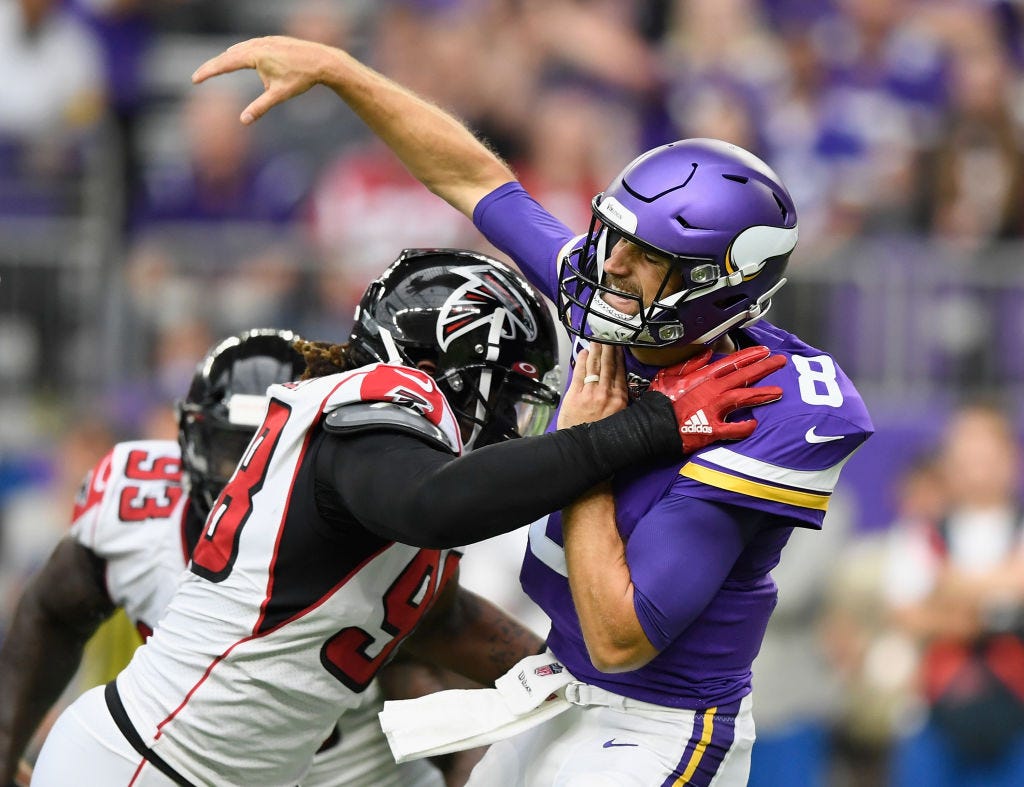Cousins, Once Removed
Kirk Cousins is no longer a Viking. And I'm not sure there is much to take away from it, except that sometimes feelings mean more than facts. The Kirk Cousins era is over, long live Kirk Cousins.
With the news that Kirk Cousins is signing a four-year deal with the Atlanta Falcons – worth $45 million per year, with $100 million guaranteed – it’s the end of the Cousins era in Minnesota.
It’s an unusual thing to reflect on because the pervading feeling from his tenure from fans has been one of persistent mediocrity. Or, just-better-than mediocrity.
For the first several years of his Minnesota career, he couldn’t shake the questions about his .500 record – enough so that fans continued to call him a .500 quarterback well after he bucked the trend and started legitimately winning. He finished his Vikings career with a 0.574 record.
It’s also a stupid statistic. Since 2018, he’s finished ahead of Joe Burrow, Deshaun Watson, Russell Wilson, Justin Herbert and Matthew Stafford but behind Mitchell Trubisky and Jimmy Garoppolo.
But even though it is impossible to judge quarterbacks by their talent level through their win total, it’s undeniable that this is who he is. He’s a .500 quarterback not because he can only manage to win half of his games, but because his essence belongs to a .500 quarterback.
He’s a game manager not because he checks it down – his deep ball throw rate and average depth of target are just above league average since 2018 – but because he plays like a guy who checks it down. Cousins has the weird distinction of being a boring quarterback who played some of the most exciting games we’ve ever seen.
Cousins is a garbage-time stat-padder who only had 2.5 percent of his EPA come in garbage time – ranked 24th of 32 quarterbacks since 2018. He ranked 23rd in percentage of plays to come in garbage time. He can’t come back from behind, even though he ranks fifth in fourth-quarter comebacks since 2018.
The closest thing we have to an agreement between perception and reality is Cousins’ toughness — a passer willing to wait in the pocket until the last possible moment and get clocked by a 300-pound demon willing to rip his head off. He’s tough. But he’s not exciting.
Cousins is a victim of anchoring bias; how he played for the first several years in Minnesota has become who he is, statistics be damned.
And none of that is really false, because what the detractors are telling you isn’t that Kirk Cousins can’t do this or that – they’re telling you that they don’t believe in him and he can’t do anything to create that belief. He’s not a quarterback who inspires.
That’s what the Kirk Cousins era is.
He was brought in to bring the franchise over the hump and win a Super Bowl and didn’t get the deal done. After years of uninspiring play, fairly or unfairly judged, it seems like fans were willing to experience another emotion – any emotion – whether it was delight or despair.
Kirk Cousins Is Security
Though I expected Cousins to stay in Minnesota, I’m not surprised by the move to Atlanta.
Cousins has often been described as a player who wants stability, and there’s some reason to believe that. Given his tightly controlled schedules and maniacal study patterns, his emphasis on his family and God, it’s easy to mistake the now-former Vikings quarterback as someone who highly prizes stability.
That’s not quite it, though – he values security. It is easier to explain Cousins, both on the field and off, through the lens of security, comfortable in the knowledge that the organization that employs him also values him.




